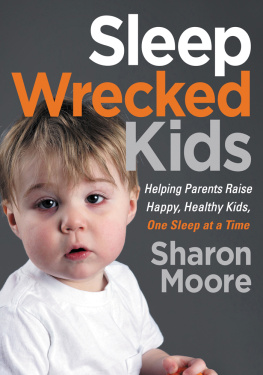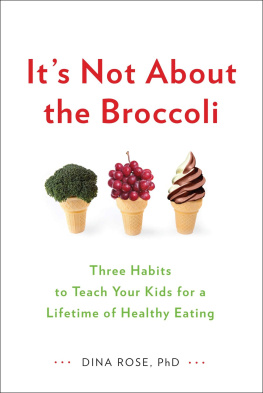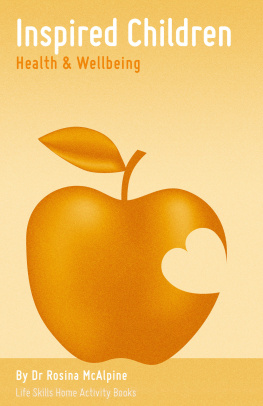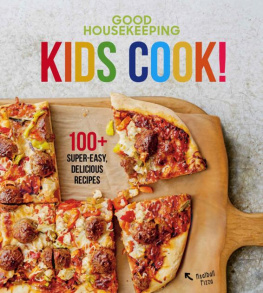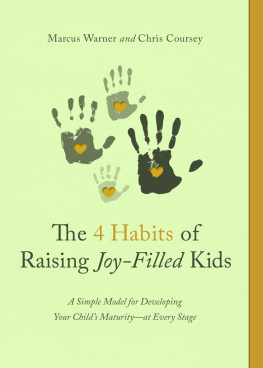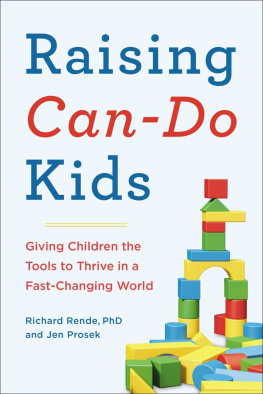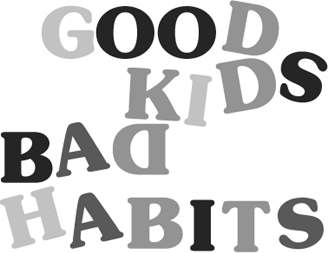CONTENTS
WAKE-UP CALL
FOREWORD
By Michael F. Roizen, M.D., and Mehmet C. Oz, M.D.
How Healthy Are Your Childs Habits?
Take the RealAge Healthy Kids Test and Find Out
HOW TO TURN BAD HABITS INTO GOOD ONES
Chapter 2 EAT UP
Creating Healthy Food Habits That Will Last a Lifetime
(no, they dont have to give up fries forever)
Getting Kids to Play More than Video Games
(even that 9-year-old Nintendo nut)
Convincing Kids That Being CleanTeeth to ToesIs
Worth the Effort
(hey, you might even get them to floss)
Teaching Kids Good Homework Habits
(the kind that will get them ahead in school)
Routines That Build Up Your Childs Self-Esteem
(accentuate the positive, eliminate the negative is still good advice)
Habits That Keep Kids from Getting Hurt
(including the number one piece of protective sports gear)
Staying on Top of Your Childs Health
(and preventing the illnesses that threaten kids most)
BOOT UP
Online Tools, Resources, and Inspiration to Help Your Family Grow Healthier
EDITORS NOTE: Mike Roizen and Mehmet Oz are Americas new favorite physicians, thanks to their phenomenal bestsellersYOU: The Owners Manual and YOU: On a Dietand their unforgettable TV appearances, including the show where they explained everything anyone ever wanted to know about poop (like: it should be s-shaped). Poop is a subject theyve had plenty of experience withnot only as doctors, but as diaper-changing dads. Dr. Roizen has two kids, Jeff and Jenny, and Dr. Oz has four, Daphne, Arabella, Zoe, and Oliver.
A s doctors, we both see the long-term effects of good kids with bad habits virtually every time we go into the operating room. The patients we treat get younger and younger, but their bodies biological agesor RealAgesare older and older. Clogged arteries, high blood pressure, diabetic complications, flabby muscles, and joints stressed by obesity are practically a given.
As dads, we have worked to protect our own kids from todays overeating, underexercising lifestyle. But we discovered firsthand what every parent knows: It isnt easy. Which is why Good Kids, Bad Habits was written. Like us, Dr. Trachtenbergwho has three children of her ownknows that parents need every morsel of help they can get to convince kids to put down the remote, pass up the cookies, grab an apple, and go for a bike ride. Both of us learned similar lessons along the hectic six-lane highway we took to raise our children.
Still, knowing what kids should do has always been less tricky than getting them to actually do it. How many parents do you know who have great intentions, yet somehow their kids veer way off course? Thats why when Mikes first child, Jeffrey, was nine months old, his wife persuaded himOK, forced himto take a course called Parent Effectiveness Training. But he says today that it turned out to be one of the best courses he ever took, because it taught him how to communicate with kids and, yes, certain patients, who really dont want to hear what their dad, or doctor, is saying.
From that class, from our own parents, and simply from being dadsthough theres nothing simple about fatherhood!we wound up figuring out five principles that really help kids form good habits for life.
Make cant a four-letter word.
Figure out who owns the problem and has to solve it.
Be a positive role model.
Do fun, healthy things together.
Stick up for your siblings and your friends.
First, try to guide the kids toward activities that they can do, where theyll shine, and then always hand out compliments whenever they do something well or simply kind. Like Mike saying to his daughter, Jenny, it was terrific of you to stop and help that man across the street, especially when you were worried about being late for dance class.
Second, and a critical important foundation for good habits, is to tell children (and others) the truth about who owns a problem. This example is a bit dramatic, but its a real one Mike had with his son: Jeff, if you dont wear your bike helmet and you get hit by a car, you could end up so brain-damaged that you couldnt play baseball or even turn on the TV. You might not have enough gray matter left to care, but it would destroy me to see you in the hospital for the rest of your life. So do me a favor: Wear your helmet. In the end, Mike (like other parents) owned the helmet problem because ultimately hed have to cope with the results of his son not wearing one.
But heres a problem Jeff owned. His dad said to him, Good bet that eating those cheese-smothered fries will keep you off the team because theyll slow you downtheir artery-clogging effects will keep your muscles from getting enough blood. That one was Jeffs decision to make. Guess what he did! Knowing when they own a problem lets kids be responsible for their own choices. And yes, sometimes theyll make as many bad bets as a drunken gambler, but overall theyll gradually take responsibility for healthy choices.
Its important to package all this advice with love, of course. Kids may blow off your brilliant insights, even at the risk of a battle, but if the insights are offered with love, the battle will blow over pretty easily. And the advice may save them later on.
Adults also have to lead by example. Try to be a role model for good health habits, from exercise to eatinglike choosing walnuts over chips or tomato sauce over mayonnaise. For instance, instead of watching sports on TV, play games with your kids and try to make it so much fun that it keeps them coming back for more. Mehmet and his brood are currently crazy for ball tag, which pits him against them. He runs around kicking a soccer ball, and anyone the ball touches has to freeze. The other kids can release the freeze by tagging him with their hands, but if Mehmet freezes all of the kids before they tag each other, he wins. Naturally, the game is all about beating dad, so theres nonstop running, yelling, and laughing. But because its a huge workout, its a win every time.
Remember that much of what kids learn about food, fitness, tattoos, sports, sex, sleep, homework, piercingyou name itdoesnt come from you. It comes from other kids. Having a health-conscious older sibling, or cool kid next door whom the kids look up to, can be a godsend. Ozs eldest, Daphne, is both cool and takes great care of herself. Not only do her sibs admire her but shes so smart about health that she wrote a whole book about it at age nineteen. And his eleven-year-old, Zoe, is the family athlete. She drags seven-year-old Oliver to every game she goes to, and now hes as hooked on sports as she is.
Finally, teach kids to stick up for each other and their friends. When they give someone else a boost, the other kid feels good, they feel goodand the favor usually gets returned.
Those five guidelines should help your kids, like ours, form good habits and avoid bad ones. They give kids a sense of self-esteem and responsibility, a live-in role model, the knowledge that health can be fun, and a foundation for lifelong trusting relationships.


